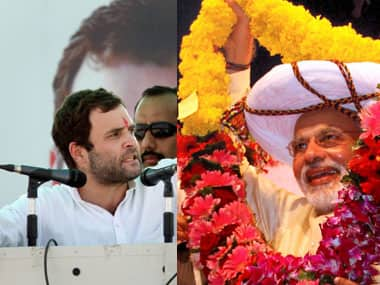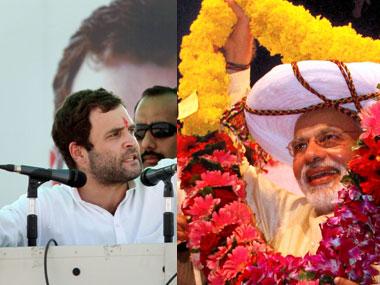Both talk about dreams - of others and of their own. Both talk about the aspirations of young India. Both claim to have a vision of a better India. And both despite the hype surrounding them, make little sense. That is probably where the similarities in the typical Rahul Gandhi and Narendra Modi speeches end. The differences are more pronounced. One is self-conscious to the point of being diffident, the other is overconfident to the point of being unbearable. Rahul appears to be person burdened with a role for which he has had no adequate preparation while Modi carries the airs of a man who can do no wrong. The former reflects the state of mind of a confused homegrown philosopher and the latter the cockiness of a man who believes who can get away with anything, including lies. [caption id=“attachment_1116243” align=“alignleft” width=“380”]  One is aloof, the other desperate[/caption] To put it unsubtly, one comes across as a novice to the job and the other as a seasoned actor good at manipulating people. Rahul Gandhi’s speech at Baran in Rajasthan on Tuesday was insipid and soulless, the same way it was in Jaipur a few days ago. In Jaipur, he had claimed “I am ready to forgo my own dreams to fulfill your dreams’’; in his speech yesterday, he spoke about how the poorest in India should have the biggest dream. “If we don’t let you dream, India can’t progress,” he said. The dream theme is surely getting overdone. The Congress vice-president appears to be running out of content to make his speeches fresh and lively or he is tiring already. His speech writers must exert themselves some more. Not a natural orator like Modi, Rahul fails to build emotional connect with the audience. He could make this weakness up with details, specifics and anecdotes. In none of his public speeches, has he appeared to have enough depth to keep the audience engaged. Possibly, it comes from his lack of exposure to real responsibility or real understanding of the people he claims to identify with: the aam aadmi. Election speeches are supposed to be a communication exercise. For someone who has been in politics and among people for nine years, he communicates very little that’s worthwhile. At least he could have a couple of good speakers in his entourage. Modi’s case is different. He is a competent public speaker and like all competent public speakers he knows what works with the audience. He does not mind making exaggerated claims about his achievements and he is never embarrassed about letting slip a lie or two to make a point. By now, the country is aware that this man can carry the audience with the force of his eloquence. The substance in his speeches, however, still remains a grey area. Scratch the surface and look beyond the claims of achievement, and there isn’t much in terms of specifics. His views on the economy may be music to the ears of textbookish economists but are far too simplistic in view of the country’s ground realities. His understanding of foreign policy looks no different from that of the lay jingoist. Of course, he is yet to explain what his stand on the minority communities, specifically the Muslims, is. Impressive speeches are alright but a lot more clarity on issues is required from a man who aspires to be prime minister of the country. Rahul obviously is more disappointing than Modi. The feeling of disenchantment is aggravated by the fact that he shows no inclination to assume any responsibility unlike the latter. Ambition and hunger for power are not bad until they become an obsession. One man is at least trying to achieve something for himself and stick his neck out, while it is difficult to understand what the other is up to. The speeches of both reflect the difference - Modi’s have a hint of desperation; Rahul’s a touch of aloofness.
One is self-conscious to the point of being diffident, the other is overconfident to the point of being unbearable.
Advertisement
End of Article


)
)
)
)
)
)
)
)
)



